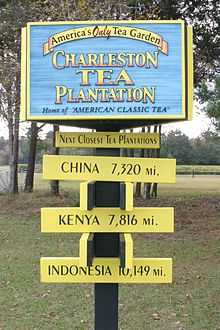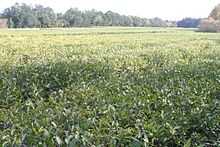Charleston Tea Plantation
The Charleston Tea Plantation is located about twenty miles south of Charleston, South Carolina on Wadmalaw Island. Owned by the Bigelow Tea Company, it grows the tea sold under the brand name American Classic Tea from the Camellia sinensis plant. The Charleston Tea Plantation is the only working tea plantation in the United States and is open to the public for tours of the grounds and factory and for hosting private events. Every year they also host the First Flush Festival celebrating the beginning of the harvest season.

History
In 1799, French botanist, Francois Andre Michaux, brought the Camellia sinensis plant to the United States and gave it to Henry Middleton. They planted the tea at Middleton’s plantation. The tea seemed to thrive in areas like Charleston and Georgetown. It took many attempts by multiple companies and individuals to successfully establish a tea company without an early failure. These failures included plantations in Georgetown, Greenville, and Summerville, the longest of which lasted less than twenty years. The Thomas J Lipton Company decided to give it a try. .[1] In 1960, they bought the failing tea plantation in Summerville and in 1963 they moved out to Wadmalaw Island and operated a research station for about twenty-five years.[1] .[2] The Charleston Tea Plantation, as it is known today, was established in 1987 when Mack Fleming and William (Bill) Barclay Hall bought the land and the research station from the Lipton Company.[1][3] Mack Fleming, a horticultural professor at Trident Technical College, had been running the plantation for the Lipton Company, while Bill Hall was a third generation tea tester from England.[1][2] Along with establishing the plantation, they created the American Classic Tea brand. This tea is still grown at the plantation as of 2012 and the brand continued even though the Fleming-Hall partnership did not last past 2003.[1] They had some differences in opinion on how to run the plantation and ran into trouble when profit margins began to drop.[4] The plantation was put up for auction at this point, where the R.C. Bigelow Company in Connecticut bought it for $1.28 million.[1][4] Bill Hall joined Bigelow at the plantation and keeps it running and growing the tea to sell across the United States.[1] The Charleston Tea Plantation was opened to locals and tourists to visit and tour the grounds and the factory.[3]
The Tea

The plantation uses the Camellia sinensis plant to produce the black tea. It is a bush that the workers have to keep manicured and in straight rows in order to harvest properly. These bushes grow from clones, not seeds to ensure that every plant grown at the plantation is exactly the same to keep the flavor of the tea consistent from season to season.[5] Mack Fleming, while working for Lipton, invented the Green Giant, a cross between a cotton picker and tobacco harvester, which is still used today to harvest the leaves of the Camellia Sinensis plant.[5][6] This machine cuts off the top layer of leaves from the bushes, collects them, and then they are taken to the factory for the rest of the production process. The main point of production is to dry the leaves. The leaves go through a series of drying processes where first they are laid out for twelve to eighteen hours to wither, then the oxidation process for a little under an hour, and finally they are baked to remove the rest of the moisture. The excess sticks and fibers are removed and the tea is packaged. The tea is harvested from May to October.[5]
The plantation packages American Classic Tea and sells six different flavors in tea bags or the loose tea form. These flavors include the regular American Classic Tea, Charleston Breakfast, Governor Grey, Plantation Peach, Rockville Raspberry, and Island Green Tea.[3] Wal-Mart helps package the tea under its American Choice label, which helps the local farm get word out to more consumers. As a small farm, they needed a way to spread their name and make sure the people in the United States knew about their locally grown tea and they hoped consumers would jump on the bandwagon of buying local products.[6] It helped when the White House discovered the locally grown tea and since 1987, the American Classic Tea brand of the Charleston Tea Plantation has been the official tea of the White House.[7]
The Plantation
The Charleston Tea Plantation is located on Wadmalaw Island, outside of Charleston, South Carolina and is open to visitors Wednesday through Sunday. Admission is free and they offer tours, tea tastings, and other amenities.[5] The factory tour takes visitors inside the factory and covers history, harvesting, and production. The Trolley Tour covers the grounds and the growing of the Camellia sinensis plant to produce the tea. The plantation also offers a tour guided by Bill Hall, called the Bill Hall Exclusive, which covers every aspect of the plantation in more detail. Group tours and school field trips frequent the plantation and private events are often held on the grounds. There are multiple spaces for weddings, receptions, and corporate events offered by the plantation in order to bring in more visitors.[3]

Since Bigelow bought the Charleston Tea Plantation, they have been working on updating the machinery, the process, and expanding the grounds as well as production. They planned to have a 66% increase of amount of Camellia sinensis plants to help increase production. Bigelow also sent Bill Hall to South America to research some more modern tea manufacturing equipment to update the factory. As soon as Bigelow bought the farm, they took out the old irrigation system and installed a newer, more-efficient system to help cover all of the 127 acres of tea plants. They also went into the factory and the equipment that Bill Hall could not find a modern replacement for; they rebuilt it to be more efficient. Bigelow’s main goal is to increase production through expansion and efficiency.[7]
First Flush Festival
The First Flush Tea Festival is an annual festival hosted by the Charleston Tea Plantation marking the start of the tea harvesting season. The name, First Flush, means the new leaves that are beginning to grow on the tea plant bushes that are ready to be harvested for production. The plantation serves the visitors the first tea produced in the new season for free allowing them the chance to taste it in hopes of pulling in new customers. The plantation also brings in local food vendors to set up booths and local musicians to entertain the crowds. There is always an area for kids as well, including a playground or jump castle. The festival began in 2006 and the sixth annual First Flush Festival will be held at the end of May 2012.[3]
References
- ↑ 1.0 1.1 1.2 1.3 1.4 1.5 1.6 "South Carolina - History of South Carolina Tea Farms". SCIWAY. Retrieved 17 February 2012.
- ↑ 2.0 2.1 "Wadmalaw Island, South Carolina - Charleston Tea Plantation & American Classic Tea". SCIWAY. Retrieved 17 February 2012.
- ↑ 3.0 3.1 3.2 3.3 3.4 "About Us". Charleston Tea Plantation. Retrieved 17 February 2012.
- ↑ 4.0 4.1 "Money". USA Today. 11 April 2003. Retrieved 21 February 2012.
- ↑ 5.0 5.1 5.2 5.3 Axelrod, Karen (2006). Watch It Made in the USA: A Visitor's Guide to the Best Factory Tours and Company Museums. Emeryville, CA: Avalon Travel Publishing.
- ↑ 6.0 6.1 Bowes, Martha. "Brewing Up American Pride: Charleston Tea". TeaMuse. Retrieved 21 February 2012.
- ↑ 7.0 7.1 Bernstein, Sally. "American Classic Tea: Deep in the Heart of Tea". Sally's Place. Retrieved 21 February 2012.
External links
Coordinates: 32°37′11″N 80°11′08″W / 32.61972°N 80.1856°W